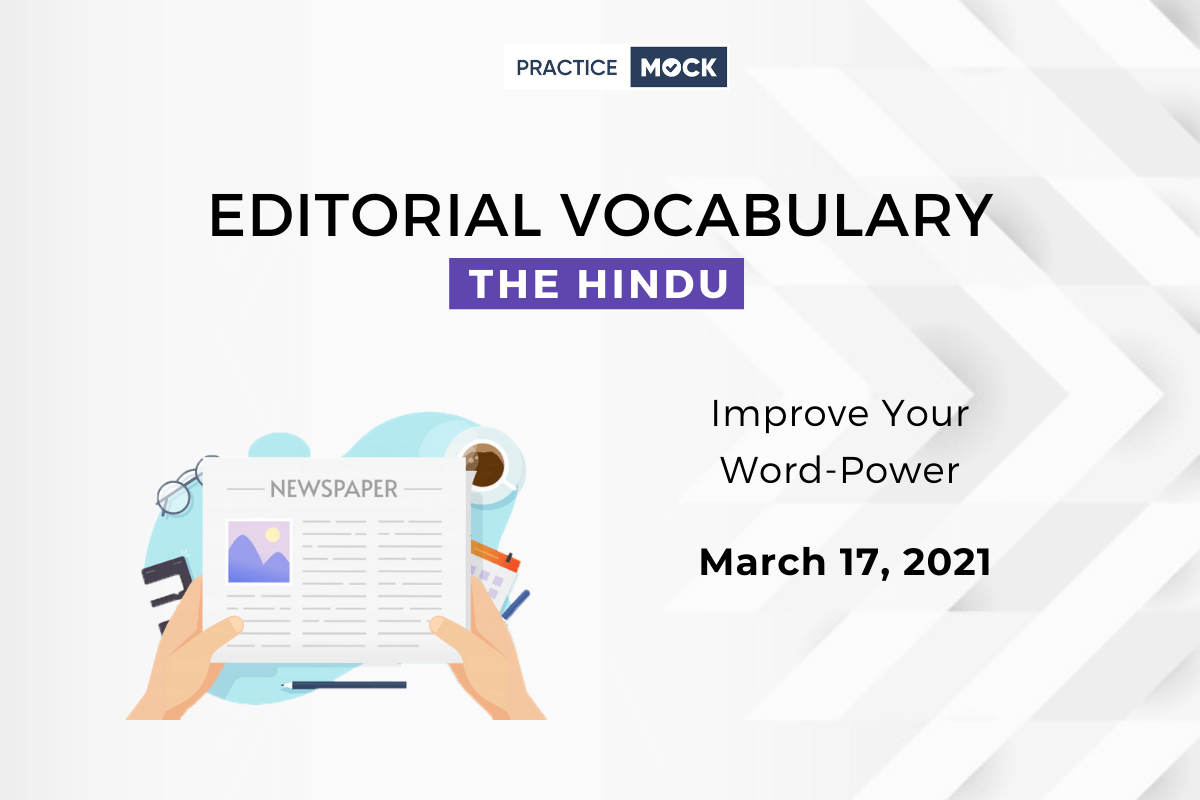Today, we are here with a new set of difficult words along with their meanings. Candidates preparing for the major upcoming examinations must keep learning and revising these new set of words on a daily basis so as to perform well in the English section. Today’s Hindu Editorial talks about “BRIDGING THE GAP: ON DEFICIT IN OBC, SC POSITIONS VACANT AT IIMS”.
Difficult Words & their Meanings
| Difficult Word/Phrase | Contextual Meaning |
| deficit | the amount by which money spent is more than money received |
| pallid | showing no enthusiasm |
| exempt | to excuse someone or something from a duty, payment |
| beneficiary | a person or group that receives money, advantages from something |
| envisaged | to expect or imagine something in future |
| deprived | lacking something that is needed |
| elite | those people or organizations that are considered the best or most powerful compared to others |
| agitated | worried |
| egalitarian | based on the idea that people are equally important |
| affirmative | relating to a statement that shows agreement |
Bridging the gap: On deficit in OBC, SC positions vacant at IIMs
Govt. should sponsor preparatory plans to help fill faculty posts in Central institutions
A severe deficit (the amount by which money spent is more than money received) in the number of OBC, SC, ST candidates recruited as faculty in Central institutes of higher education has been revealed by Union Education Minister Ramesh Pokhriyal in Parliament, drawing attention once again to the pallid (showing no enthusiasm) state of reservation in some of India’s elite institutions. Some of the striking data show 62% unfilled vacancies for SC in the IIMs and 90% for OBC in the IISc, while vacant positions are on average about 38% to 52%, taking Central Universities, IISERs, IIT (non-faculty), IGNOU, and Sanskrit Central Universities into account. The data confirm that the trend seen earlier in the IIT system extends to many more institutions, highlighting a serious mismatch between the government’s equity-building goals and actual recruitment outcomes. In the case of the IITs, an official committee suggested that the way out would be to exempt (to excuse someone or something from a duty, payment) these institutions from reservation, as provided for under the Central Educational Institutions (Reservation in Teachers’ Cadre) Act, 2019, or to dereserve lower faculty positions after a year, if suitable candidates from the beneficiary (a person or group that receives money, advantages from something) communities are not found. This cannot obviously be a salutary course for official policy, when the reservation system, envisaged (to expect or imagine something in future) as an improvement on western ideals of affirmative action, is widely seen as the shortest path to equality and equity. What could help bridge the gap is a better understanding of the lacunae in the education system, marked by a sea of deprived (lacking something that is needed) public schools and colleges, hyper-commercialised private universities and colleges and islands of elite (those people or organizations that are considered the best or most powerful compared to others) institutions such as the IIMs.
The failure of the Central higher education institutions to recruit faculty to all the reserved positions is usually attributed to the absence of enough qualified candidates, as the Education Ministry’s committee for IITs did. One of the forward-looking remedial measures suggested by the panel was to start government-sponsored preparatory programmes, which would both equip aspiring faculty, and create a pool of research talent. This has merit in the context of management, science and other disciplines, and in the short term, could help qualified individuals overcome the deficiencies of their preparatory years. Such courses would also make these institutions of higher learning more socially responsive, meeting the goal of addressing historical deprivation of communities based on caste. Yet, there are larger questions that need answers, and which continue to be agitated (worried) in courts. One of them is whether there should not be even greater attention devoted to the most marginalised within the reserved categories, such as SC, since trickle down quota benefits for them are scarce. The egalitarian (based on the idea that people are equally important) answer would be to continue expanding the pie of opportunity in the public realm, through ever greater funding of quality universal education at all levels and aiding the deprived through affirmative (relating to a statement that shows agreement) action on the road to equality.
This is all from us regarding today’s Hindu editorial. Read The Hindu Editorial Vocabulary– March 16, 2021.
- Sign Up on Practicemock for Updated Current Affairs, Free Topic Tests and Free Mini Mocks
- Sign Up Here to Download Free Study Material
Free Mock Tests for the Upcoming Exams
- RRB PO 2024 Free Mock Test
- RRB Clerk 2024 Free Mock Test
- SSC MTS Free Mock Test
- SSC CHSL Free Mock Test
- SSC CGL Free Mock Test
- GATE Mechanical Free Mock Test
- GATE Civil Free Mock Test
- NABARD Gr. A Free Mock Test
- SBI Clerk Mains Free Mock Test
- SSC CPO Free Mock Test
- AFCAT Free Mock Test
- CAT Free Mock Test
- NIACL Assistant Free Mock Test
- UIIC AO Free Mock Test
- UIIC Assistant Free Mock Test
- GIC Assistant Manager Free Mock Test
- NICL AO Free Mock Test
- Free SSC Live Test
- UPSC CSAT Free Mock Test
- CDS-I Free Mock Test
- RRB ALP Free Mock Test


